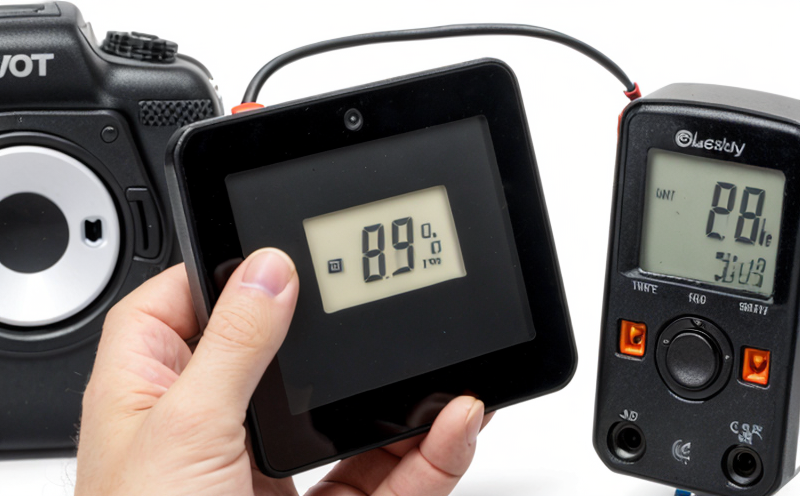Electronics & Small Devices Safety Testing
The demand for consumer electronics and small devices continues to rise, driven by advancements in technology and increasing global connectivity. Ensuring that these products meet safety standards is paramount not only to protect consumers but also to maintain brand reputation and compliance with international regulations.
Consumer products are subject to rigorous scrutiny from regulatory bodies around the world, including those set forth by ISO (International Organization for Standardization), IEC (International Electrotechnical Commission), and ASTM International. These standards cover a wide range of safety requirements to mitigate risks associated with electrical shock, fire hazards, mechanical failures, and other potential dangers.
At Eurolab, our comprehensive testing services encompass a variety of parameters critical for the safe operation of electronics and small devices. From basic insulation resistance checks to more complex tests like durability under extreme conditions, we ensure that each product is thoroughly evaluated before reaching the market. Our expertise spans across various sectors such as household appliances, personal care products, and even children's toys.
Our testing protocols adhere strictly to international standards including IEC 62368-1 for audiovisual, information technology equipment, and telecommunications equipment; EN 50607 for digital cameras; and ASTM F963-17a for toy safety. Compliance with these norms ensures that our clients’ products not only meet local requirements but also exceed them, opening up markets in multiple regions.
Furthermore, we understand the importance of speed-to-market strategies within today’s competitive landscape. By offering expedited testing options tailored to individual client needs, Eurolab aims to minimize disruptions while maintaining high standards of quality assurance.
In summary, electronics and small devices safety testing involves a multidisciplinary approach combining engineering principles with regulatory compliance knowledge. At its core lies the commitment to safeguarding public health and wellbeing by preventing accidents caused by poorly designed or manufactured products.
Scope and Methodology
The scope of electronics & small devices safety testing includes but is not limited to:
- Insulation resistance measurement
- Dielectric strength assessment
- Overcurrent protection evaluation
- Mechanical stress endurance tests
- Heat dissipation analysis
- Voltage drop under load conditions
The methodology employed at Eurolab integrates advanced analytical techniques and state-of-the-art equipment to provide accurate results. Each test follows strict guidelines prescribed by relevant international standards, ensuring consistency across all samples tested.
For instance, during insulation resistance measurements, we apply a specified voltage between exposed conductive parts and accessible non-conductive surfaces to determine the level of electrical isolation within the device. This helps identify potential points where short circuits could occur, leading to dangerous situations like electrocution.
In dielectric strength assessments, alternating current is passed through the sample while monitoring for breakdowns that indicate insufficient insulation materials or poor design choices. Overcurrent protection evaluations involve simulating fault conditions and observing how quickly protective mechanisms react to prevent damage or injury.
Mechanical stress endurance tests subject components to repeated cycles of loading and unloading to assess their resilience over time. Heat dissipation analyses measure the efficiency with which generated heat is transferred away from sensitive internal parts, preventing overheating that might lead to failures or fires.
These detailed procedures ensure comprehensive coverage of all necessary safety aspects while adhering strictly to specified tolerances outlined in applicable standards such as IEC 62368-1 and ASTM F963-17a.
Eurolab Advantages
When choosing Eurolab for your electronics & small devices safety testing needs, you gain access to a team of highly qualified professionals who possess extensive experience in this field. Our laboratory adheres strictly to international standards and maintains accreditation from recognized bodies ensuring reliability and credibility.
- Comprehensive Coverage: We offer full-service solutions covering all aspects of product development, from initial concept stages right through final approval processes.
- Innovation Leadership: Stay ahead of trends with our cutting-edge research and development capabilities backed by decades of industry leadership.
- Global Reach: With branches across continents, we provide localized support without compromising on global consistency.
- Certification Support: Assistance with obtaining necessary certifications tailored to specific markets or regions.
The combination of our technical prowess and unwavering commitment to excellence makes Eurolab the ideal partner for ensuring your products comply fully with all applicable regulations. Whether you're developing new innovations or refining existing models, we have the expertise needed to help you achieve success in every market segment.
Use Cases and Application Examples
The application of electronics & small devices safety testing extends far beyond mere compliance; it plays a crucial role throughout the entire product lifecycle. Here are some practical examples illustrating its significance:
- New Product Introduction: Before launching any new electronic device into the market, thorough testing ensures that all risks are identified and addressed early in development.
- Compliance Audits: Regular audits conducted by regulatory agencies require up-to-date documentation demonstrating ongoing adherence to relevant standards.
- Risk Management: Identifying potential hazards during design phases allows manufacturers to implement necessary improvements before production begins.
- Recall Prevention: Post-production testing helps detect latent defects that could become apparent only after widespread distribution.
By integrating safety testing into standard operating procedures, companies can proactively manage risks associated with their products. This proactive approach fosters trust among consumers and enhances brand reputation.





